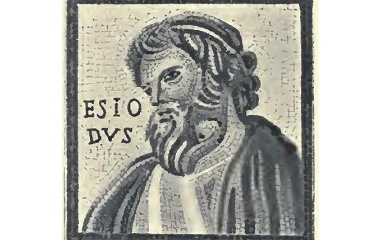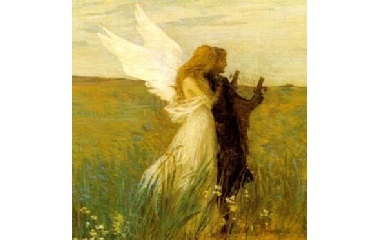- Pronunciation: heh-see-od or he-sea-odd
- Origin: Boeotia, a district in central Greece
- Role: Mortal
- Occupations: Poet, Farmer
- Also known as: Hesiodus, Hesiodos
- Offspring: Stesichorus
Who Is Hesiod?
Considered the first didactic poet, Hesiod’s poems were philosophical in nature, though easy to understand. His epic poems were used to teach people about a variety of topics, including working life, agriculture and the Greek gods. Because of this, Hesiod’s works are fundamental historical artifacts.
Family
After the death of his father, Hesiod was involved in a bitter dispute with his brother, Perses. This was in regards to the property left behind by their deceased father. Unfortunately for Hesiod, Perses won both disputes, though it is important to know that each alleged dispute was decided by the same judges. However, the account of this property dispute comes from Works and Days, a text which scholars look upon with caution as an autobiographical account of Hesiod’s life.
Brief History
Due to abject poverty, Hesiod’s father crossed the sea from Cyme in Aeolis (modern western Turkey) to Boeotia, more specifically at the bottom of Mount Helicon. The top of Mount Helicon was considered to be where the Muses (the goddesses of inspiration) resided. They are said to have visited Hesiod and ordered him to compose poetry. Hesiod’s poetry composed a family tree of the Greek gods based on the conception of creation. For example, the Earth was “yawned” into existence by Gaea, the goddess of the Earth, birthing mountains, heaven, and sea, chaos, order, work, life, economics, and agriculture. Not only was his work instructional for religious purposes, it also contained detailed agricultural knowledge due to Hesiod’s background as a farmer and shepherd. Hesiod believed that work was the purpose of man and that each man needed to work in order not only to survive, but to also live a satisfying life. Hesiod was one of the first Western poets who compiled his work in a written manner as before him, nearly all epic poetry was passed down through an oral tradition. This is because the Greek alphabet was composed far later than the language was spoken. The written word revolutionized what was possible with epic poetry and paved the way for poetry to change from being a tradition recited using only memory.
Characteristics
Hesiod would memorize his poems by reciting heroic songs while he tended to his sheep. He believed that his poetic gifts were given to him by the Muses while he was working hard on his land. According to legend, Hesiod was handed a poet’s staff and blessed with a poet’s voice by the Muses, and he used this voice to create his epic poems. As the Muses traditionally lived at the top of Mount Helicon, it is possible that this was one of the reasons why Hesiod became a poet in the first place. Due to the geographical significance of his location, it is possible to speculate that Hesiod was inspired by the spirit of the land and the myth that was enveloped in it. This may have led to the blending of concepts that make up the works of his epics.
Literature
The time of Hesiod’s literature is disputed, though it is generally agreed by scholars that it originated around 700 B.C.E., shortly after Homer’s. It is noteworthy that the reason dates of works are disputed—as well as dates of birth in Ancient Greece—is because there was no chronological dating system at that time.
Hesiod is credited with at least two epic works. Although in the past he has been credited with more, it is widely accepted that those works were created by poets from the same school of thought as Hesiod and not actually by Hesiod himself. One of the epics Hesiod composed is called Theogony, which means the genealogical account of the gods. The word theo comes from the Ancient Greek words theos meaning gods, and gony, which comes from the Latin word gonia. Gonia itself comes from the base of the Ancient Greek word gignesthai, which means “to be born.” Also attributed to Hesiod is another epic, Works and Days, the first recorded instance of didactic poetry. Didactic poetry is poetry which instructs or informs.
One example of work previously attributed to Hesiod but now disputed is The Shield of Heracles. Hesiod is also considered the earliest author from mainland Greece whose work still exists in its original form. Some of Hesiod’s works include work from other poets, notably the Precepts of Chiron, the Melampodeia, the Aigimios, the Ornithomanteia, the Astronomy, and the Catalogues of Women.
Hesiod’s works of literature are often compared with those of Homer, author of the Iliad and the Odyssey. Although Hesiod’s poems are considered epics—as Homer’s poems are—they are considered so for fundamentally different reasons. Unlike Homer’s work, Hesiod’s work is considered epic not because of its length, but because of its language. Hesiod’s was more accessible, down-to-earth, and practical, which led to its widespread appeal. This makes it a crucial historical artifact for a chronicled life of workers in Ancient Greece, details about agriculture and the nature of work, as well as a meticulous account of the relationship between the Greek gods. Though Theogony is considered complex and often confusing, it reflects an unrivaled account of the intricate relationship between divine beings. It is important to consider that—as the poet is seen to be gifted because of the Muses—poetry would be an exercise to please the gods. This shapes the style and content of the poetry as much as Hesiod’s relationship with the self, land, cosmos, and work.
Explanation of the Myth
According to myth, Hesiod and Homer engaged in a poetry contest. This arose from an extract from Works and Days where Hesiod won a competition in Chalcis in Euboea at the Funeral Games. This led to Hesiod being awarded a bronze tripod by the sons of Amiphidamas—a prize he then allegedly gifted to the Muses of Mount Helicon. This account led to later rumors of a poetry contest between Hesiod and Homer, though this is generally considered false, as scholars tend to agree that Hesiod and Homer never crossed paths. It is important to consider that the Ancient Greeks generally saw inspiration as a divine or semi-divine practice, so poetic excellence was generally seen as a divine work. This is evident from several factors: the fact that Hesiod believed his poetic gift came from the Muses, that his work revolved around the Ancient Greek gods, and that he gifted his award to the Muses. This belief in the Muses and the gods reflects the cultural belief of this time in polytheistic Ancient Greece.
Death
After he lost his alleged second lawsuit to Perses, Hesiod fled to Naupactus, where he was allegedly murdered by the sons of his host in Oeneon because he seduced a maiden. It is claimed that their offspring was the lyric poet Stesichorus, the first of his kind in the West.
On the order of the Delphic Oracle, Hesiod’s bones were taken to Orchomenus, where a monument to him was constructed in the marketplace.










